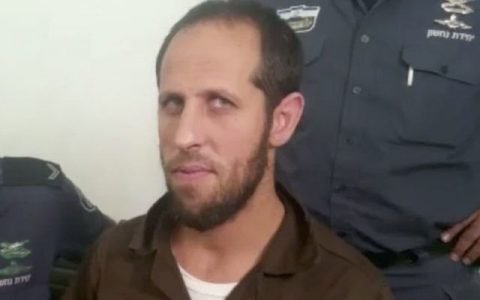
Arab Israeli man sentenced to 16 years in jail for aiding Temple Mount terrorists
An Arab Israeli man was sentenced to 16 years in prison on Wednesday for assisting three gunmen who killed two police officers just outside Jerusalem’s Temple Mount compound in July 2017.
The Haifa District Court also ordered Amjad Muhammad Ahmad Jabarin, from the northern city of Umm al-Fahm, to pay NIS 258,000 ($73,000) each to the families of the officers killed in the attack.
Jabarin was convicted in July of assisting in a terror attack, obstruction of justice and conspiracy to commit a crime.
Court papers showed that Jabarin transported the three terrorists to Jerusalem, spoke with them about their plans ahead of time, and “even offered to join them in carrying out the attack on at least two occasions.”
The three terrorists themselves were killed by police in the attack, which claimed the lives of Master Sgt. Kamil Shnaan, 22, and Master Sgt. Haiel Sitawe, 30.
During his interrogation, Jabarin also revealed connections between the three terrorists — all of them named Muhammad Jabarin from Umm al-Fahm — and the outlawed Northern Branch of the Islamic Movement, the Shin Bet security agency said during his trial.
On July 14, at approximately 3 a.m., the three gunmen arrived at the Temple Mount from Umm al-Fahm for prayers with guns and a knife hidden under their clothes. The weapons had been smuggled into the site by an accomplice.
They remained at the holy site for four hours, then walked out toward the Muslim Quarter. Just after 7 a.m., they opened fire at officers Sitawe and Shnaan, who were stationed at one of the entrances to the Temple Mount, killing them. Other police officers on the scene shot back at the terrorists, killing them.
Amjad Jabarin was arrested on July 23, nine days after the attack, and indicted in August 2017.
According to court papers, Jabarin trained with the terrorists ahead of the attack, joining them when they went to practice shooting their improvised “Carlo” submachine guns.
The night before the attack, he also drove the three to a soccer field in Umm al-Fahm, which served as a pickup point for a shuttle to the Temple Mount, knowing that they were armed and planning to carry out the shooting.
After the attack, Jabarin also hid some of the killers’ belongings — cellphones and car keys — which they’d given him beforehand.
The Temple Mount attack led to weeks of instability in Jerusalem and the West Bank. Following the Friday morning shooting, Israel shut down the complex for the rest of the day — something that hadn’t been done on a Friday, the most popular day for Muslim prayer, in nearly 50 years.
When the site reopened two days later, police had installed metal detectors at the entrances to the holy site, which local Muslim officials decried as attempts to change the status quo. The weeks that followed saw numerous bloody clashes between police and East Jerusalemites, who refused to pass through the detectors and instead held at times violent protests outside the Old City.
A degree of calm was restored to the capital after the government agreed to remove the metal detectors and other security measures from the entrances to the Temple Mount on July 25.
Source: Times of Israel





